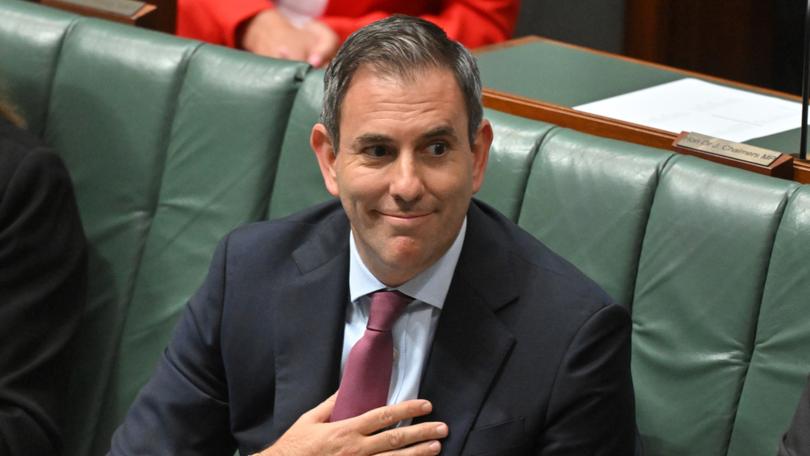JACKSON HEWETT: Jim Chalmers Future Fund sleight-of-hand screams of a desperate, cynical electoral cash splash
JACKSON HEWETT: The Treasurer has sprung an impressive three-card monte on voters in his bid to slip his fingers into the Future Fund. The reality is, it screams of a desperate electoral cash splash.

Treasurer Jim Chalmers must have loved card tricks as a kid. How else could you explain the three-card monte effort sprung on voters last night?
Barely hours after telling Parliament the cupboard was bare and swearing he would be the very model of fiscal restraint, Dr Chalmers has attempted to hoodwink the public by slipping his fingers into the deep pockets of the Future Fund.
It’s a cynical ploy that damages Dr Chalmers’ reputation at a time when Labor should be communicating to voters that the party are honest brokers.
Sign up to The Nightly's newsletters.
Get the first look at the digital newspaper, curated daily stories and breaking headlines delivered to your inbox.
By continuing you agree to our Terms and Privacy Policy.In his ministerial economic update yesterday, Dr Chalmers identified the three biggest issues facing the country — an energy transition that is taking too long, a collapse in productivity that is reducing the long-term prosperity of the country, and a housing industry that doesn’t build enough houses and is failing the young and the poor.
These are problems in desperate need of a fix but they won’t get solved before the next election.
Attempting to coerce the Future Fund to throw money at the problem has the stench of the hastily thrown together student debt relief program, which Labor borrowed from Joe Biden’s now-discredited playbook. The HELP handout which will cost taxpayers $11 billion is a short-term sop that unfairly benefits some at the expense of others.
In issuing the first Future Fund mandate in 15 years, Dr Chalmers is trying to assure us the Government won’t meddle with the independence of the Future Fund. If that is so, why issue a mandate at all?
It screams of a desperate electoral cash splash, where the cash will either never get splashed, or be so long in due diligence that anything shovel ready will be years away.
It’s hard to check your pockets when the money is decades away.
The Fund acknowledged that it already has pumped $6 billion into domestic infrastructure projects, including a stake in a renewables company, a data centre and investments into Melbourne and Perth airports.
In June, the Fund’s brains trust determined that we are entering an era of geopolitical risk and as a result would upweight investment in Australia by backing infrastructure assets that make the supply chain more resilient and funding projects related to the energy transition.
Which means that if the economic models for any of the Treasurer’s pet projects stacked up, the Future Fund would be looking at them anyway.
But the problem is investments in renewable projects are already being crowded out. Super funds, who are pressured by their members to invest in such projects, are having a hard time finding investments that are commercially viable.
Housing is even worse. Insiders say it is financially unfeasible for a commercial developer to fund a pure social housing project, and mixed-use properties, where a small fraction of the dwellings are set aside for low-income buyers, are marginal at best.
The Future Fund’s mandate is to deliver four to five per cent above inflation annually and it has delivered, growing from $60 billion to $230b. If the Fund is “encouraged” to bankroll the government’s pipe dreams at a time when other commercial players are struggling for returns, what hopes will it have of delivering a stockpile for a genuine rainy day?
Former Future Fund chair David Murray told the Financial Review that the messing with the Future Fund’s independence would end up in “boondoggle budgeting” and if the Treasurer had such high-value, commercially viable ideas, they should be funded off budget.
But Dr Chalmers can’t afford to borrow more cash in an era of declining revenues without destroying any chance of a legacy as a responsible Treasurer. In any case, throwing money at the problem now would force the Reserve Bank to raise interest rates at precisely the wrong time for an election.
So the best the Treasurer can hope for is that the voting public doesn’t notice this sleight of hand and walks away with the impression the Government is “doing something”. After all, it’s hard to check your pockets when the money is decades away.

